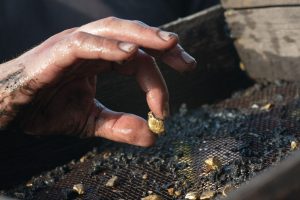Gold Mining
Gold is mined using four different methods. Placer mining, hard rock mining, byproduct mining, and processing gold ore.
Gold ore processing – Cyanide process
Cyanide extraction of gold may be used in areas where fine gold-bearing rocks are found. Sodium cyanide solution is mixed with the finely ground rock that has been proven to contain gold and is then separated as a gold cyanide solution from ground rock. To precipitate residual gold metals, zinc is added. Zinc is removed with sulfuric acid, leaving a silver or gold sludge that is generally smelted into an ingot and then shipped to a metal refinery for final processing into pure metals of 99,9999 percent.
In recent years, the technique of alkaline cyanide dissolution has been highly developed. It is especially suitable for processing low-grade gold, but its use is not limited to such ores. This extraction method involves many environmental hazards, largely due to the high acute toxicity of the involved cyanide compounds.
How is cyanide used in mining?
A sodium cyanide solution is commonly used to leach gold from ore. There are two types of leaching:
- Heap leaching: In the open, cyanide solution is sprayed over huge heaps of crushed ore spread atop giant collection pads. The cyanide dissolves the gold from the ore into the solution as it trickles through the heap. The pad collects the now metal-impregnated solution which is stripped of the gold and resprayed on the heap until the ore is depleted.
- Vat (or tank) leaching: The ore is mixed with cyanide solution in large tanks. Although the chances of spills are lower because the leaching process is more controlled, the resulting waste, known as tailings, is stored behind large dams (tailings impoundments) which can and do fail catastrophically.


Cyanide is highly toxic and can result in substantial environmental impacts and public health risks if released into the environment. Cyanide spills have resulted in major fish kills, contaminated drinking water supplies, and harmed agricultural lands.
The challenge of pumping cyanide is not utilizing unnecessary water. Most pump manufactures will utilize packing or mechanical seals to perform their sealing operation. However, packing requires frequent maintenance and attention. It must be properly adjusted to allow water to flow to prevent overheating and scoring the shaft.
Mechanical seals are expensive and require a certain amount of flush water and infrastructure and maintenance. Flush water can dilute the product which producers want to avoid and the loss of water is costly.
Since water can be scarce at the site and expensive to use, Wilfley pumps work well in the cyanide process due to the dynamic and static seal technology. The Wilfley dynamic seal coupled with the latest static seal technology eliminates the need for packing, mechanical seals, and flush water. This sealing technology has proven that Wilfley pumps can operate trouble and maintenance-free as compared to conventional seals saving the customer on downtime, lower maintenance cost, and thousands of dollars of water usage.
We provide customized solutions for all your industrial requirements. Talk to us.
